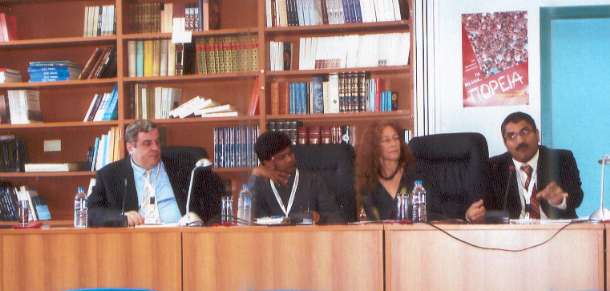|
|||
|
Αρχική σελίδα =>ΒΙΟΓΡΑΦΙΚΟ ΣΗΜΕΙΩΜΑ (GR) =>CURRICULUM VITAE (EN) =>ΤΑ ΒΙΒΛΙΑ ΜΟΥ/MY BOOKS =>ΕΠΙΣΤΗΜΟΝΙΚΑ ΑΡΘΡΑ/SCIENTIFIC ARTICLES =>ASSISTED HUMAN REPRODUCTION (RU) =>ΕΑΠ/HELLENIC OPEN UNIVERSITY =>VOLOS ACADEMY FOR THEOLOGICAL STUDIES =>ΟΑΚ/OAC/ORTHODOX ACADEMY OF CRETE =>ΔΙΑΛΕΞΕΙΣ/LECTURES =>EXPERTS MEETING IN BOSSEY 2008- GENEVA (CH) =>JOHANNESBURG GLOBAL CONSULTATION 2007 =>MOXE/ ENCYCLOPAEDIA =>ΠΕΙΡΑΜΑΤΙΚΕΣ ΝΟΤΕΣ/MUSIC CD =>CHURCH CHANTING =>ΤΡΕΛ..ΑΡΗΣ/CRAZY..ARIS =>ITERA ETHICS BOARD MEMBER =>ΕΠΙΚΟΙΝΩΝΙΑ/CONTACT |
PRESS RELEASE The Global Consultation entitled Stem Cell Research in the
service of human life?: Ethical and Theological Reflection, organized
by the World Council of Churches (Project on Faith, Science,
Technology and Ethics) and the Volos Academy for Theological Studies
has started today, Monday 9 November 2009. Twenty five participants from all
over the world and various Christian and religious Traditions have gathered to
discuss and reflect on this crucial and ambivalent issue. At the opening ceremony, the Director of the Rev. Pr. Vasilios Kalliakmanis ( Then, an introduction to the Project, its philosophy and its aims made
by Dr. Maria van Heemstra (WCC/Geneva) and Packia Asirvathan (WCC/Geneva). Dr. Vassilios Fanaras, who is a project consultant on behalf of the Pr. James Rusthoven ( Finally, papers given by Dr. Donald Bruce (U.K.) and Pr. Theocharis
Patargias ( The participants went into small groups to discuss about bio-ethics,
bio-politics and Churches/religious institutions response on stem cell
research. Finally, the participants were invited to share a ‘table of love’
in a local parish, where they had the opportunity to experience Greek
hospitality and be informed about the initiatives, activities and actions that
they take place in Holy Metropolis of Demetrias on spiritual and social level.
 PRESS RELEASE Wednesday,
November 11, 2009 was the concluding day of the Global Consultation entitled Stem-Cell
Research in the service of human life?: Ethical and Theological Reflections,
organized by the World Council of Churches (Project on Faith, Science, Technology and
Ethics) and the Volos
Academy for Theological Studies. The Consultation took place in the Academy’s
grounds in Melissatika, In the
morning session, participants discussed the crucial moral and theological
issues and questions raised both during the presentations and in the ensuing
discussions among the small groups. Following
the discussion, Mr. Jaydee Hanson (USA) offered a detailed review of a number
of important legal issues and facts arising in various countries around the
globe where stem-cell research takes place, all directly related to bioethical
matters. Mr. Hanson asked his audience to consider which of these issues would
be a cause of agreement or disagreement on the level of ethics, as well as how
we ought to approach and delineate the notion of otherness and the need to
respect otherness in our present context. Among the
afternoon speakers were Mrs. Maryam Pazooki (Iran/Canada), who stressed the
question of gender in stem-cell research; Mr. Fabian Salazar Guerrero
(Colombia), who summarized the basic questions raised in Latin America with
regard to economic and social justice, with particular attention to bioethics;
and Dr. Japhet Ndhovu (Kenya), who stressed that the single, most important concern
for Africa is justice to the weak and the poor – in the sense of an equal
distribution of the benefits of medicine and biotechnology to everyone,
regardless of economic and social status. The final
session announced the conclusions of the Consultation, as well as a list of
suggestions to the Churches and to society at large, in the form of a request
to continue supporting dialogical enquiries on the important moral and
theological dilemmas, as these ensue from developments in the bio-sciences. Near the end
of the Consultation, thanks were offered to the organizing members, both
international and local (the Holy Metropolis of Demetrias, the
|
||
